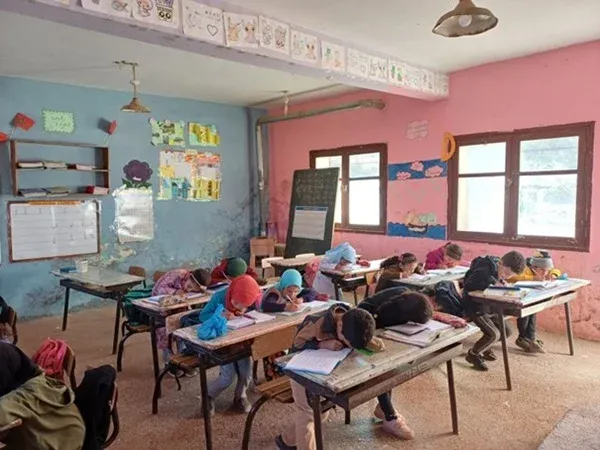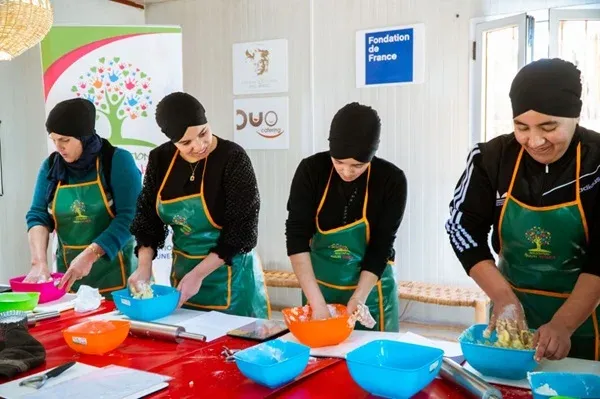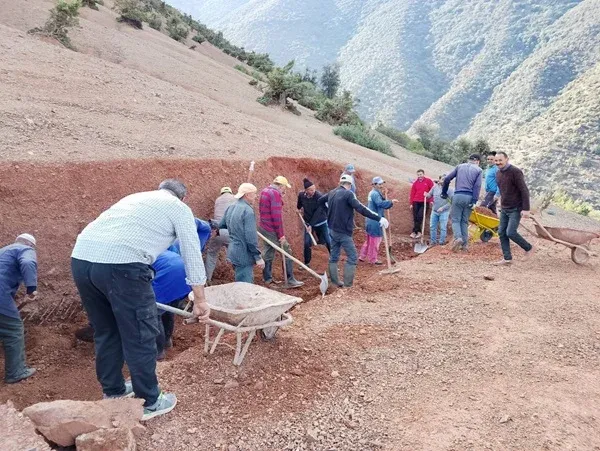Solidarity Morocco: Fondation de France's priorities after 18 months of support
A year and a half after the devastating earthquake that struck Morocco on September 8th, 2023, killing more than 3,000 people and leaving thousands injured and homeless, Fondation de France remains mobilised on the ground to meet the needs of the population. It has already allocated over €5.1 million to 44 initiatives in the affected area. Here is a look back at the last 18 months of support aimed at responding as effectively as possible to evolving needs.
The earthquake primarily struck the High Atlas region of Morocco, a rural area far from public infrastructure. The scattered nature of the douars, often isolated from one another, makes access to hospitals, schools and administrative services difficult. In the aftermath of the earthquake, damaged roads made access even more difficult, with some residents having to walk for several hours to reach a health centre.
Supporting reconstruction
Although some essential infrastructure has been rebuilt, many villages remain destroyed. Among the initiatives supported, the Marrakech Entr'aide association is rehabilitating school facilities. In Ouarzazate, for example, it has rebuilt the Tareq Ben Ziad school for over 200 pupils to earthquake-resistant standards. The association also provided school furniture and teaching materials to enable the pupils to continue their education.
 The Tareq Ben Ziad school in Ouarzazate has been rebuilt by the Marrakech Entr'aide association.
The Tareq Ben Ziad school in Ouarzazate has been rebuilt by the Marrakech Entr'aide association.
The Emergency Architects Foundation also contributes to the sustainable reconstruction of damaged infrastructure. Its architects and engineers work to ensure the safety of buildings. In particular, it has rehabilitated a boarding school for young girls in the town of Asni, with the support of the Béatrice Schönberg Foundation. Around 50 girls from disaster-stricken villages have been able to continue their education. In the town of Moulay Brahim, the Foundation has built a reception centre for young children, providing childcare services and extracurricular activities. In the town of Taddart, a new, larger water reservoir, adapted to the needs of 150 households, has been installed and the supply network connected to the well has been restored.
Supporting children and safeguarding access to education
Access to education remains a major priority, particularly in rural areas, where many children, especially girls, face socio-economic and cultural obstacles to attending school. AMESIP (Moroccan Association for Aid to Children in Precarious Situations) runs a dozen reception centres for children in several Moroccan towns, offering cultural activities, pre-school units and training to combat abuse, school drop-out and child labour. Following the earthquake, the association built a shelter in Amizmiz to house almost 150 orphaned children. Set up on land made available by the authorities, the village comprises 12 dormitories, a kitchen, an infirmary, teaching areas, etc. The children are supervised by social workers, who provide a range of cultural and sporting activities.
In Marrakech, the Al Amane association works to promote gender equality, particularly among young people. Three caravans travel around Marrakech providing educational, cultural and sporting activities (theatre, dance, painting, football, etc.). Nearly 150 girls and 150 children have already benefited. The association also supports 60 girls who have dropped out of school, helping them prepare for their exams as independent candidates. The association has also set up two cooperatives, one agricultural (production of amlou, eggs, azola cultivation) and the other focused on tourism, responsible for organising activities to attract visitors, such as creating tourist routes and showcasing local craftsmanship. These cooperatives generate income for 200 women, who are trained in these activities.
"After the earthquake, I lost everything. I had no roof over my head, no food and no resources. The Al Amane association provided me with accommodation and met my basic needs. I was able to take professional training in IT and project management. I decided to set up a tourist accommodation project in my village and this is now my business. It's thanks to initiatives like this that women like me can change their destiny and that of their families."
Hanane, aged 19, supported by the Al Amane association
Facilitating access to healthcare and providing psychological support
In the most isolated areas of Morocco, access to healthcare remains a crucial issue. The Rangs d'Honneur association deploys mobile radiology and dental care units. This scheme, run by volunteer doctors, responds to emergencies while guaranteeing long-term medical care in areas with no infrastructure. In its medical-surgical-social caravans, the association offers consultations and diagnoses for conditions such as cancer, infectious diseases and periodontal disorders. This initiative covers all the affected areas, particularly the most isolated parts of the High Atlas.
Meanwhile, the Association de l'Enfance Handicapée (AEH) works for the social and economic inclusion of people with disabilities. In the rural areas of Taroudant province, it is helping more than 120 people, including nearly 50 children, by providing emergency aid: technical support, medical care, re-education, rehabilitation and psychological support for people with disabilities affected by the disaster. In the region's villages, the association has set up "Disability" stands to offer residents a personalised diagnosis. It also travels to villages to help the most isolated people who are unable to move, providing specialist medical equipment. Psychological support is also available through discussion groups and individual sessions run by professionals.
Contributing to economic recovery
Promoting the economic autonomy of people affected by the earthquake is a key lever for sustainable reconstruction. Since its creation in 2018, the Maison Bonheur association has been supporting young people, especially young women, in vulnerable situations, particularly in mountainous regions. It offers them training in the catering and hotel sectors. These courses are followed by work placements, with personalised support in the search for work placements and employment. At the same time, these young people receive psychosocial support to enhance their well-being and integration into the workplace.
 The Maison Bonheur association provides cookery courses for young women.
The Maison Bonheur association provides cookery courses for young women.
The Association des Populations des Montagnes du Monde works to protect and promote Morocco's mountain regions through socio-economic and cultural initiatives. It supports around 30 families in the douars of the Ouirgane rural district, in the province of Al Haouze, by distributing farming equipment (seeds, plants and livestock) to help them become more self-sufficient. It has also built a drinking water reservoir to improve local production conditions.
 Construction of a drinking water reservoir in the Ouirgane commune, by the Association des Populations des Montagnes du Monde.
Construction of a drinking water reservoir in the Ouirgane commune, by the Association des Populations des Montagnes du Monde.
"Solidarity Morocco" key figures:
- 85,000 donations
- 12 sheltered foundations involved
- €11.4 million raised
- Over €5.1 million redistributed
- 44 initiatives supported
TO FIND OUT MORE
→ Solidarity with Morocco: 6 months of action
→ Emergencies: rebuilding lives over the long term
→ Solidarity with Turkey and Syria: two years of initiatives

